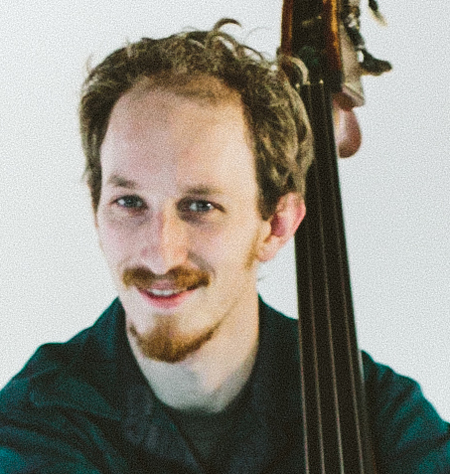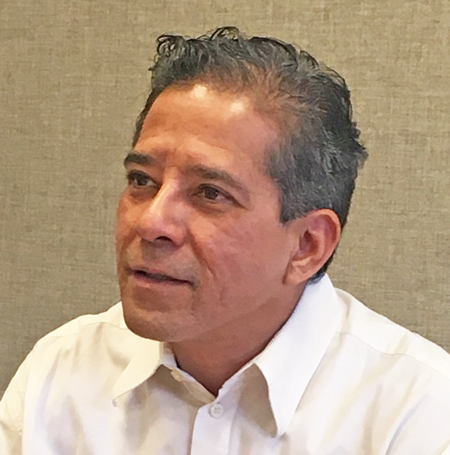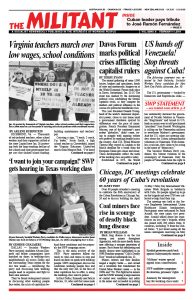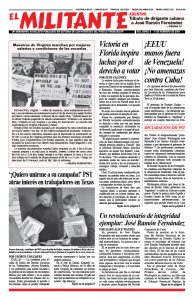In Defense of the US Working Class, by Mary-Alice Waters, is now off the presses.
It features the talk by Waters at an April 24-26, 2018, international conference in Havana organized by the Cuban History Institute and the Central Organization of Cuban Workers (CTC). Waters is a member of the Socialist Workers Party National Committee and president of Pathfinder Press, publisher of the book.
Her talk was followed by a panel on the U.S. class struggle titled, “From Clinton to Trump: How US working people are responding to the anti-labor offensive of the bosses, their parties and their government.”
The panelists, leaders and supporters of the Socialist Workers Party with years of experience in industry and trade unions as well as on the land, explained how workers have fought back against the 40-year offensive by the employers and their government.
In Defense of the US Working Class includes summaries of those remarks, as well as short biographies of the panelists. In previous weeks the Militant printed those of Alyson Kennedy, Omari Musa, Willie Head and Jacob Perasso. This week we feature the presentations by Harry D’Agostino and Róger Calero.
Copyright © 2019 by Pathfinder Press. Reprinted by permission.
?
Harry D’Agostino. Harry is a worker, bass player, band leader, and Young Socialist. He and his band perform throughout the Northeast and North Central regions of the US. Although he was unable to join the Havana panel at the last minute, his prepared remarks were distributed to those present.

D’Agostino explained that like many millions of young workers he has held numerous jobs, from small shops to warehouses. Also like millions, he’s almost always been a “temp worker” who gets no guaranteed hours or days of work, no health coverage, vacation time, or unemployment compensation — and can be fired at any time. Many young workers also struggle under the weight of tens of thousand of dollars of student debt “urged upon us by the government and banks as a way to ‘get ahead.’” Most have no hope of ever paying it off, he said.
He described the eye-opening impact of the West Virginia teachers strike, where he and others of his generation saw for the first time the power of the working class in action. “A large-scale workers movement, a social movement across an entire state was entirely new to us,” D’Agostino said. “Even more so, a victory was something new. It made it possible to think about fighting and organizing ourselves to emulate that example.”
?
Róger Calero. Róger came to the US from Nicaragua with his family when he was fifteen. He has worked in meatpacking plants in Minnesota and Iowa, where he was a member of the United Food and Commercial Workers and involved in organizing drives and in union struggles defending the rights of immigrant workers. In 2002 the US government arrested and attempted to deport him, triggering a successful international defense effort that won the support of many unions. He was the presidential candidate of the Socialist Workers Party in 2004 and 2008.
Calero focused his remarks on what is at stake for the labor movement in the defense of immigrant workers. He explained what is behind the anti-immigrant drive that has been ratcheted up by the administration of Donald Trump, and how the working class in the United States has been strengthened by the incorporation of millions of foreign-born workers.

The political struggle to win the labor movement and big majority of working people to defend immigrant workers, he said, “is a life-and-death question for the working class.” The scapegoating of immigrants is one of the biggest weapons used by the ruling class and both its parties to divide and weaken the working class.
The source of anti-immigrant prejudice, he noted, is not the working class. It’s the bosses who promote and benefit from such prejudice, like they profit from discrimination against Blacks and against women. They bring in immigrant labor to increase competition among workers, break unions, drive down wages, and intensify exploitation of the working class as a whole, as they did in the meatpacking industry in the 1980s.
“In the absence of an effective fight by the trade unions to defend the interests of the entire working class — and that includes the effort to organize workers without papers into the unions — this scapegoating of immigrants finds an echo among sections of the working class,” Calero noted.
“But these attitudes are driven by the competition to sell their labor power, not racism.”
The US rulers’ objective is not to stop the flow of immigrants, only to regulate it based on their needs, as they have always done. “The vulgar prejudice spewed by President Trump and others around him,” Calero noted, “his agitation to ‘build the wall,’ the brutal detentions, raids, deportations, workplace immigration audits, and other repressive measures are aimed at heightening insecurity and fear among all working people, not immigrant workers alone.”
But it is the rulers themselves who are driven by fear, fear of the class battles that are coming and the unity that can be forged by US and foreign-born workers. We have seen this in the meatpacking plants of the Midwest, the coal mines in Utah, and other labor and social struggles.
“The political fight to win amnesty for workers without papers and defend the rights of immigrants is inseparable from the struggle to unify the working class as a whole,” Calero said. “It is vital to building a trade union movement that fights for the interests of the entire class.”


